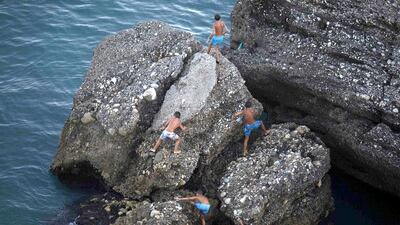At low tide, the beach where we rent a house for a few weeks in August is long and flat, with big waves crashing on a sand bar just off the beach. It’s a perfect beach for playing in the surf, building sandcastles and long walks. On the first day of vacation every year, a deep sense of peace washes over me as I crest the dune to the beach. This year, in light of the horrifying events that fill the newspapers every morning – natural disasters, disease, war – the beach feels even more like a refuge.
The other day, my sons spent the entire afternoon on this marvellous beach creating a sandcastle. Actually, it was more than a castle; it was a sprawling city with moats and towers, tunnels and arches. The boys’ creative energy was contagious and for a while a small group of children – all strangers to one another – congregated to work on this sandy project, each adding a piece to the city. There was a Gaudi-esque castle in one corner, a set of steps carved down to a “lake” in another section, and an elaborate fresco of shells and seaweed along the front wall. By the time everyone got bored and ran off to bodysurf in the waves, the sand-city must have stretched at least a metre across.
I sat in my beach chair watching the children work together and had one of those smug parenting moments that by now I should know not to entertain. “Look at my kids,” I thought, “working so well together and including all the other kids. Aren’t they wonderful?” Famous last words.
By late afternoon, after a long frolic in the waves, and a little too much sun, we were ready to head for home. That’s when my younger son asked the fateful question: could he stomp on the sandcastle? I remembered that sense of power from my childhood, the pleasure of feeling the sand yield under my feet, so I said: “Yes, go ahead.” I forgot about the older boy and the fact that he might have a stake in preserving the castle, even though we were going home and the tide would most certainly roll in and flatten everything anyway.
Younger son began stomping, older son began screaming. Older brother whacked younger brother with a boogie-board. Younger brother said some very bad words and kicked older brother, who hurled back some choice insults of his own. More indiscriminate hitting ensued and then each child stomped to his own piece of beach.
There were no more wonderful children working together. There were two quiveringly angry children, each convinced not only of his own righteousness but also of his victimhood. Fingers were pointed: he started it! No, he started it! I fell back on that time-honoured, and useless, piece of parental commentary: I didn’t care who started it, I wanted them to stop hitting each other and apologise. It takes two to quarrel, I said, so you’re each a little bit at fault.
They stared at me as if I had two heads. In childhood, there is always a good guy and a bad guy; sharing blame and responsibility is as difficult as sharing a chocolate bar or an ice-cream cone. Younger brother yelled that we were leaving anyway so who cared, but then he half-heartedly rebuilt the section of castle wall he’d demolished. Older brother, indignant, said it didn’t matter. “You’re only doing that because Mom got mad. You’re not really sorry.”
I suggested that perhaps the motivation for the rebuilding didn’t matter, only the end result, but older brother was not persuaded. “He shouldn’t have jumped on the castle in the first place,” he insisted. “He should have stopped when I asked him to, and he kicked me, and swore at me, and I’m furious. I’m not going to forgive him until I’m ready.”
What do you say to that? My parental bag of tricks doesn’t include any strategies for forcing forgiveness, other than outright bribery, which would seem to defeat the purpose. Unless, of course, the motivation for forgiveness shouldn’t matter, only the act of letting go.
Younger brother spent the next few hours moping in the shade of his brother’s discontent, waiting for him to relent, which he did, eventually. Neither boy ever actually apologised to the other and today they’re talking about building another sandcastle. Should I care that they didn’t actually apologise, if they are willing to try again to work together? I don’t know. But somewhere in this story, I’m pretty sure there’s a metaphor. Maybe even two or three.
Deborah Lindsay Williams is a professor of literature at NYU Abu Dhabi. Her novel The Time Locket (written as Deborah Quinn) is now available on Amazon

